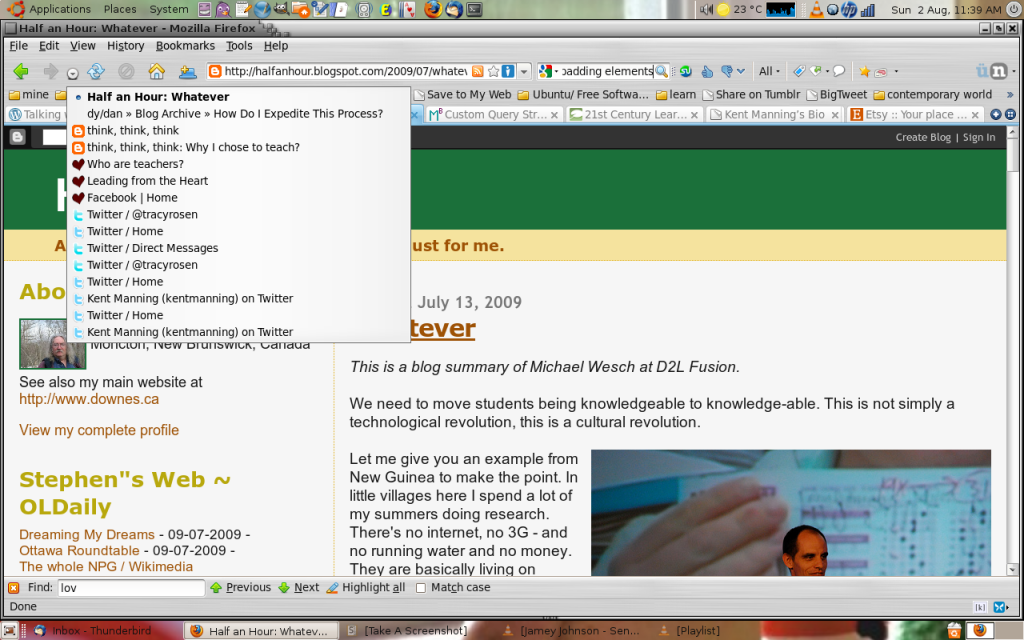Is there a big difference between public attitude towards teachers in the US and Canada?
When people find out that I am a teacher I NEVER (and I am not a wanton all caps user) am made to feel like I have settled on teaching for lack of ability to do otherwise. Did I mention NEVER?
On the contrary, people usually respond with cools and wows and I have great respect for you, it must be hard, how do you do it? They then follow with talk of their memories of school, the teacher who they’ll never forget, the cafeteria food – whatever. The point is that my job conjures up memory, stories – of hard times and good. The stuff that life is made of.
Ken Dryden talks about our personal Board of Governors and who we would like on it. He reminds us that while few of us could name specific accountants or salespeople for it we could all think of teachers we’d like to sit on it.
So I have a hard time understanding the article linked to by @AngelaMaiers today, called Schools Need Teachers Like Me. I Just Can’t Stay by Sarah Fine in The Washington Post, Sunday, August 9, 2009.
Or at least parts of it.
I can definitely understand teacher burn out. When you love teaching sometimes it’s hard to find the off switch. There’s always one more thing to do, to plan, to correct, to prepare, to present, to remind ourselves of, to talk to a student/colleague/parent/volunteer about. And that’s during the regular school year, figure in report card season and the things to do possibilities multiply exponentially.
I can definitely understand that feeling of loss when you just can’t get to that one (or more) kid. No matter what you try, s/he will still give you the cold shoulder, still skip class, still (seemingly) not care about learning. Then I remember that this is learned behaviour. That the child must have experienced so much loss of her own that she can’t let anyone else in. And my feeling of loss grows.
I can definitely understand the frustration of massive failure, when a large chunk of your group fails. Within a long history of failure, a few months with a new teacher will rarely be able to make the monumental difference needed to turn 30s to 70s – no matter how much we want it. Though it is sometimes possible with the proper structure and trust.
Working towards that structure is what keeps me sane.
But I don’t understand the lack of social recognition Sarah Fine writes about in fully one half of her article. Or, rather, the dismal recognition she describes it as having. She writes that teaching is considered as being for the unambitious and untalented, that people think it is a second class profession.
Do I live in a bubble? Are people coddling me with cools and wows and then sneering once I leave the room – can you believe she’s a teacher? How gauche!
I don’t think so. The reactions I get are honest and from the heart. People don’t share stories through whimsical smiles about things they think are second rate and undervalued.
She does have it right though. Teaching is hard work, it is life work. I wouldn’t describe it as grueling and the fact that she does makes me think that Sarah Fine was just not meant to teach. My gut reaction? This article was an attempt at justifying that.
Then I read the comments and there were quite a number that supported her views. As well as a number who felt like me, if you aren’t meant to teach don’t teach.
But I recognize that I write this from a Canadian perspective. Which begs me to ask – are Canadian teachers more valued than our American colleagues? What is different here?
3am sleepless update: Apparently Michael Doyle tried to reply to this post but he wasn’t able to post the comment. Lucky for us it made it to his own blog. Go read his take on the matter – as always, it points to truth for me. —> On Why Sarah Fine Left Teaching


